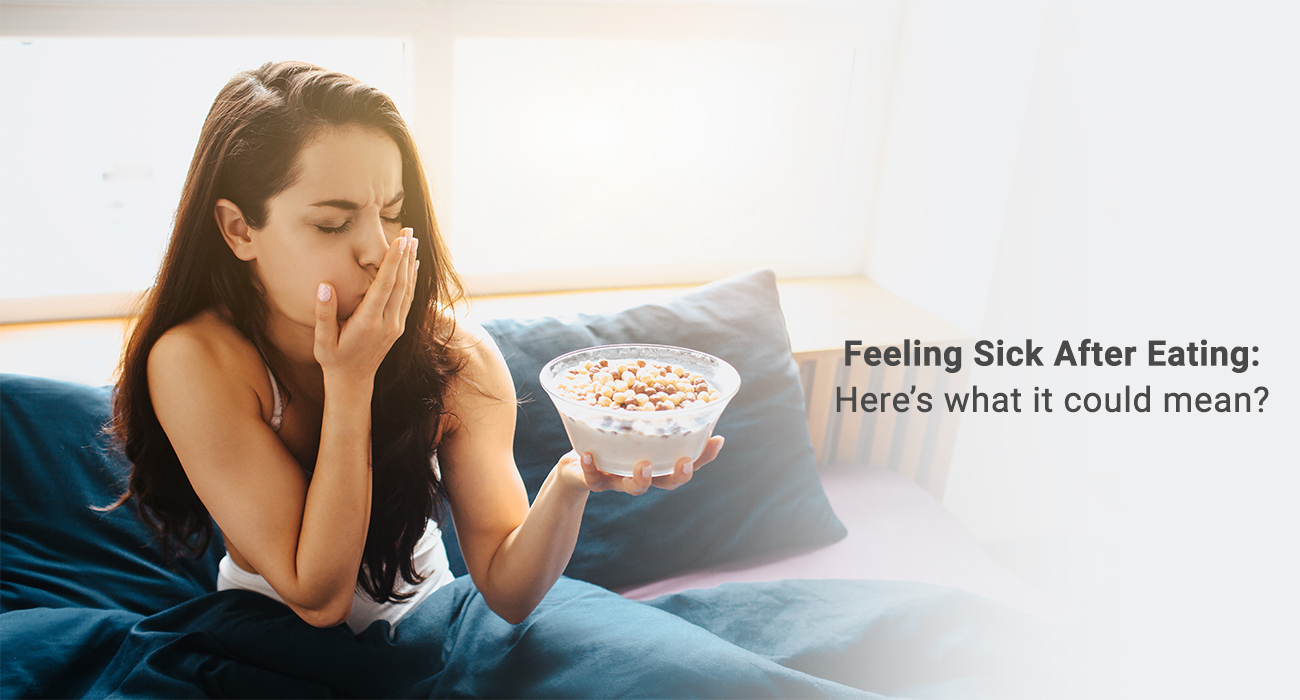Feeling Sick After Eating: Here is what it could mean?
08/05/2022
We all feel a little bloated every now and then, especially after a heavy meal, and that’s usually normal. However, if you’re always feeling sick to your stomach within minutes or hours after eating, then there may be something else going on, which might be a medical condition. There are lots of things that can make you sick. A bad headache, indigestion, or an infection, to name a few. Here we’ve talked to our experts practicing in the best Gastroenterology hospital in Jaipur to learn about why you might feel sick after eating, how to treat it, and many more.
There are various situations that can trigger nausea and vomiting after having a meal, and this can make it difficult to figure out the main cause. The following are the probable causes that you can count on:
1. Food Poisoning:
Stomach pain is a common symptom of food poisoning. Other signs and symptoms include:
Luckily, nausea from food poisoning can resolve on its own. As per the CDC (Centres for Disease Control and Prevention), food poisoning may happen when:
- Food is not heated or cooked properly
- Cooking surfaces are not cleaned properly
- The refrigerator is warmer than 40 degrees F.
You may experience symptoms within a few hours after eating contaminated food. However, in some cases, it may take days or weeks for them to surface.
2. Food Allergies:
Have you ever experienced a food allergy? You might not even feel nauseated in some cases. The symptoms may vary as everyone is affected differently by food allergies. Many people might experience milder symptoms when they first develop a food allergy. Symptoms of an allergic reaction include a rash or hives; feeling cold and clammy; a drop in blood pressure, an increase in heart rate, and swelling of your eyes and throat.
3. Bacterial Infection:
Ever heard of suffering from a stomach bug or bacteria? It's just that if you’re suffering from any kind of viral or bacterial infection, you might experience muscle aches, fever, and joint pain, along with nausea and vomiting.
4. Acid Reflux:
You can get heartburn (a burning sensation behind the breastbone) shortly after eating a heavy or spicy meal. The condition, medically known as GERD (Gastro-Esophageal Reflux Disease), can cause a nauseous feeling. GERD occurs when your esophagus is harmed by excessive stomach acid exposure.
5. Anxiety and Stress Disorders:
You might wonder if having an anxiety or stress disorder has an impact on your physical health. It can affect the same including your digestive health. The fact is that nerves connect the digestive tract (gut) to the brain, i.e., the gut-brain connection. When you are stressed, hormones and chemicals are released into your body, where they may eventually enter the digestive tract and have an adverse, inflammatory effect on your gut microbiome.
6. Overeating:
Overeating can occur in multiple instances. Instead of eating when we’re hungry, we tend to reach out for snacks, fast foods, or other edibles out of habit or while we’re multitasking. Mindful eating can help you avoid overeating.
7. Pancreatitis:
The main function of your pancreas is to create enzymes for the digestion of the food you take. But if your pancreas is damaged(inflamed), it might not produce as much enzyme as it should. Hence may produce various symptoms like abdominal pain, nausea, and diarrhea.
8. Gall Bladder Disease:
If you find yourself clutching your stomach and feeling nauseous after eating fried foods or high-fat meals (yes, even the good fats), your gallbladder could be to blame. If you have gallbladder disease, you may experience nausea 15 to 20 minutes after eating, which is usually accompanied by abdominal pain, diarrhea, changes in stool color, and, occasionally, unexplained weight loss.
9. You’re Not Taking Enough Fiber:
Not getting enough fiber for a few meals, or even a few days, is unlikely to cause major problems. However, avoiding roughage on a regular basis can result in everything from sluggish digestion which can make you feel awful after eating.
10. Not Taking Your Meals On Time:
When you eat is almost as important as what you eat, and eating too frequently or too far apart can both cause you to feel nauseous. Eating more frequently deprives your digestive system of adequate rest, resulting in sluggishness and bloating.
Treating Nausea at Home
- Nibbling on saltine crackers
- Sipping cold drink like water
- Taking sips of ginger or peppermint tea
- Eating smaller meals at regular intervals
The above-mentioned tips can help you feel more relieved if you’re feeling nauseated.
The most important things that you can do are to get enough rest and keep yourself hydrated. As suggested by our best doctors in Jaipur, you should also keep a note of how long these symptoms last and what makes them better. To know more, consult our experts from the best hospital in Jaipur.
Note: All of these tips may work if your symptoms are mild and may not work for all patients. Make sure to get yourself evaluated by your doctor if the symptoms persist.

